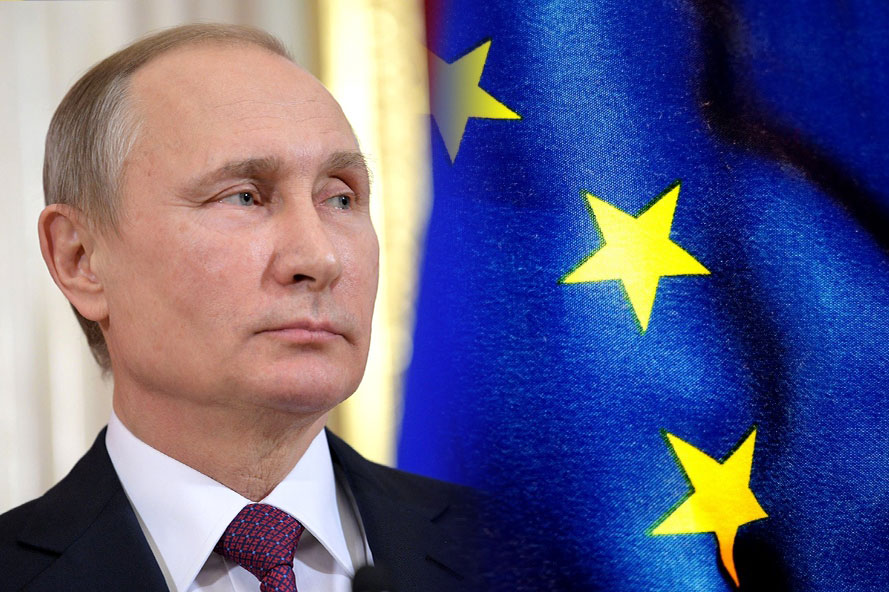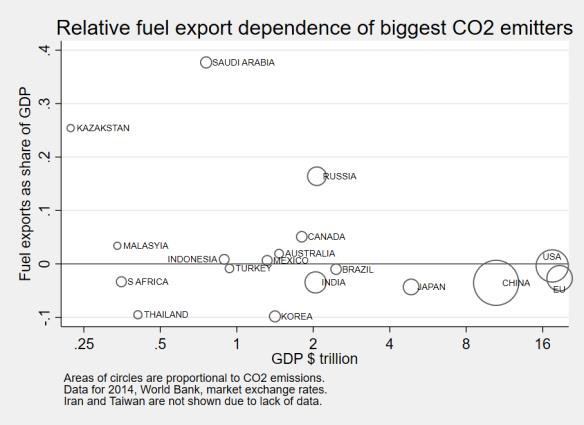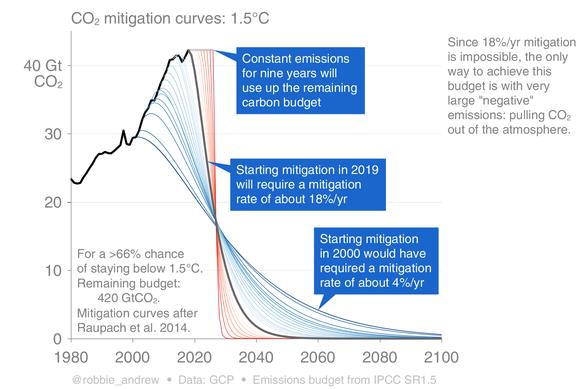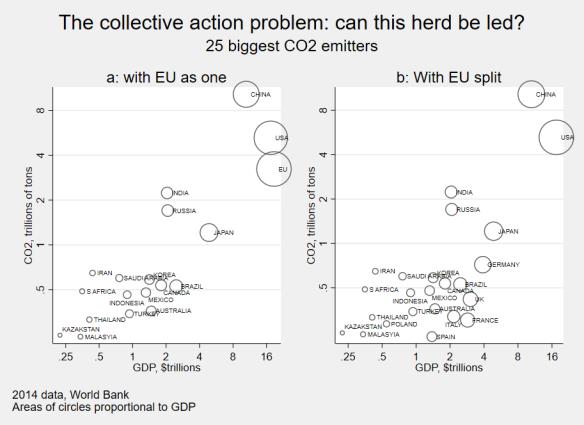Dr Frederick Guy, Senior Lecturer in Management, explains how Britain’s decision to leave the European Union will hamper efforts to combat climate change and bolster the power of Putin and other major fossil fuel exporters.

Putin – whose name I use here as shorthand for the entire oligarchy of not just Russia but all major fossil fuel exporters – wants to prevent the emergence of international institutions which would be able to bring climate change under control. That is because the control of climate change would require destroying the oil and gas business, and with it his wealth and power.
To this end, two of the central objectives of the oil oligarchs have been the installation of a US government which is hostile to international cooperation in general and cooperation on climate in particular; and the fragmentation of the European Union. Trump, and Brexit; more broadly, a science-denying Republican party, and resurgent nationalism in every European country and region.
Even soft Brexit will be enough for Putin
I will explain below why these two political objectives, in the US and in the EU, are necessary – and, unfortunately, probably sufficient – for Putin’s ends. But first let me just say that, for Putin’s purposes, any Brexit will do, Hard, No Deal … or the softest of soft, as long as Britain withdraws from the political institutions of the EU.
In Britain, where anti-Brexit arguments have focused on the damage to the UK economy and the threat to peace in Ireland, a very soft Brexit is alluring: some kind of Norway ++ which keeps the UK essentially in both the Single Market and the Customs Union, but removes it from the political institutions of the EU. In British politics such an outcome would of course be a sorry face-saving compromise, letting politicians claim to have left the EU while retaining the economic advantages of membership (at some considerable cost in the form of lost voice in making the economic rules). For Putin, though, it would be a great victory, because what threatens Putin is a coherent West- and Central European voice on climate policy. The more he can fragment the EU – through the withdrawal of a big actor like Britain, and the discord which follows – the better off he is.
We can’t know how large a factor Putin has been in the political successes of Trump and Brexit. Obviously, there’s a lot more behind the surge of nationalism around the world than such plutocratic manipulation. Yet propaganda does work – ask Goebbels, ask Maddison Avenue, ask any company or political party that invests in public relations or advertising. And just the fact that Putin has made such obvious efforts to influence domestic politics in so many countries, raises the question of why he would do so.
Geopolitics in the anthropocene
I am writing here about the power of the oligarchs of oil: about the politics of plutocracy, and also about geo-politics.
The oligarchs of oil are just one segment of the larger plutocracy which afflicts our age. The oil oligarchs present us with a different set of problems than other oligarchs, however; our diagnosis of these problems is hindered if we think of plutocracy, or of capitalism, as one undifferentiated thing.
The other most prominent members of the plutocratic class have fortunes based on locking down parts of the digitized network economy (Amazon, Google, Microsoft, privatized telephone networks, and so on), or on the extravagant protections now offered intellectual property (notable in pharma, biotechnology, and certain profitable corners of publishing). We might add to this list fortunes from the world of finance, but finance needs something to finance, and it is the monopoly sectors of the “real” economy – both in natural resources like oil and in information resources – which nourish finance. So let us speak simply of oil oligarchs and information oligarchs.
The two groups of oligarchs have a common interest in preventing the public from taking away their unearned hoards of wealth. The information oligarchs fear laws that would restore both our digital networks and our funds of accumulated knowledge to their proper state as a commons without monopolist tollgates – in short, that we will make their products free. The fossil fuel oligarchs fear that we will simply stop using their products. If justice ever comes for the information oligarchs it will be a piecemeal and prolonged set of battles, leaving the principals humbled but probably well heeled. The oil oligarchs, on the other hand, have their backs against the wall: they know that the health of the biosphere requires that their euthanasia – to borrow a technical economic term from Keynes – comes soon.
We can also think of what Putin and his ilk do in terms of state power – they act not merely as wealthy and influential individuals but as rulers – and thus of geo-politics. At first blush, we might think in terms of traditional Great Power or superpower rivalries. Putin’s politics, however, are about oil. And the geo-politics of oil is no longer primarily about control of the oil supply, but about the right to keep selling it. Any effective climate policy will sharply reduce demand for fossil fuels, which will mean, even if it is not all left in the ground, that both the quantity sold and the price will fall – shredding colossal oil fortunes.
If it seems far-fetched to reduce the policy objectives of a large state, once a superpower and still possessed of a huge nuclear arsenal, to permission to sell a single product, just look at the dependence of Russia on fuel (oil, gas, coal) exports. In 2017 – the latest year for which the World Bank provides these figures – Russia’s net exports of fuel amounted to 13% of GDP – an astonishing level for a country of that size. The only countries with higher levels of dependence on oil exports are states, like the Gulf monarchies, which produce little else (see Figure 1). Leaving the oil in the ground would not destroy Russia – if anything, it would free the country from the influence of oil, which entrenches corruption and despotism, and crowds out most other economic initiative – but it would destroy Russia’s oligarchy.

Figure 1
This is why the interests of the Russian state and the House of Saud, despite their quarrel over dominance in Syria and the Gulf, align at the global level: they need to block the emergence of institutions of international governance capable of dealing with the problem of climate change.
Governing climate change
The governance problem is well known: eliminating greenhouse gas emissions requires deep changes to our material way of life; attendant social changes; and vast investments in new clean technologies and clean infrastructure. Moreover, we have dallied so long that, in order to have any realistic hope of preventing very dangerous climate change, we need to decarbonize fast (Figure 2) – meaning that the process will be more expensive, more socially disruptive, and more politically difficult than it would have been had action been taken when the problem was first understood some decades ago.

Figure 2. Past delays mean that rapid decarbonization is necessary for climate stabilization. Graph from http://folk.uio.no/roberan
What nation will undertake such changes without the assurance that other nations will do so as well? Technically, this is what we call a “collective action problem”, a prisoner’s dilemma game with many players, blown up to the global level. Agreements are made – in Porto Alegre, Kyoto, Copenhagen and Paris – but there is nobody to enforce them, and greenhouse gasses continue to accumulate.
Dealing with climate change of course requires action at every level, from the global down to individual and community choices about how to live and what to consume. But without an overall grip on the collective action problem between countries, there won’t be effective national policies in most countries. And without effective national policies, the efforts of individuals and local communities will be weakened by the knowledge that others are taking no action, and so will not add up to enough.
For the past quarter century we have had climate agreements which have no teeth. There is no prospect of having an actual global government to enforce the agreements. How, then, do collective action problems get solved at a global level? Some say it only happens in periods of history when single hegemonic power – notably, Britain from the defeat of Napoleon until the mid-1800s, and the USA in the decades after World War II – had the weight to enforce international rules of trade and finance (rules used, of course, to the hegemon’s advantage); the same might serve for rules about greenhouse gas emissions, but there is no single dominant world power to play that role today.
Our best hope – is it shocking that it has come to a point where this is something more to hope for than to fear? – is that a small number of very large powers would act in concert as leaders, and enforcers, of international agreements to cut greenhouse gasses. The method of enforcement could be a combination of threatened withdrawal of access to export markets, and conditions placed on foreign investment.
What countries could exercise such power? In Figure 3a I plot the GDP and the greenhouse gas emissions of the world’s 25 largest economies – again, treating the EU as one country. Note that I have used ratio (logarithmic) scales, so the differences between the larger and smaller countries are compressed on the graph, but even so three big ones stand out in both GDP and emissions: China, the USA, and the EU. Big as they are, if these three giant economies decarbonized, it would not be enough to stop global warming. But all other countries depend on access to these three big markets, and investment from them. Individually, none is globally hegemonic; together, they could fill that role.

Figure 3
Figure 3b plots the same information, but with the EU split up. This leaves the US, China, and then a large mass of mid-sized emitters: six of the 25 biggest CO2 emitters are members of the EU. It is within in the mass of mid-size CO2 emitters that the collective action problem becomes overwhelming, each saying “after you”, each proposing actions that will shift costs to others. It is a recipe for non-action, for fatal delay, and that is why Putin needs to make the EU ineffective as a political unit. If you add to that the effective side-lining of the USA – its de facto alliance with Putin and the House of Saud – this configuration leaves no plausible leader, no plausible enforcer, for climate policy.
It may seem a faint hope any of that those three powers – China, the EU, and the USA – will actually choose to take decisive action to reduce greenhouse gas emissions. Perhaps it is, but other hopes are fainter still. And, if it were really such a far-fetched possibility, I do not think that the petro-powers, together with fossil fuel interests in the industrial countries themselves, would be doing so much to prevent it. Their support for both Trump and Brexit – any Brexit – is a central part of that effort to prevent the US and EU from taking decisive action on climate change.
What this should say to you if you are looking forward to any sort of Brexit, whether it be the ice bath of No Deal or the warm shower of Norway++, is that Putin will thank you for it, and that your great grandchildren, if they are among humanity’s survivors, will curse you.
